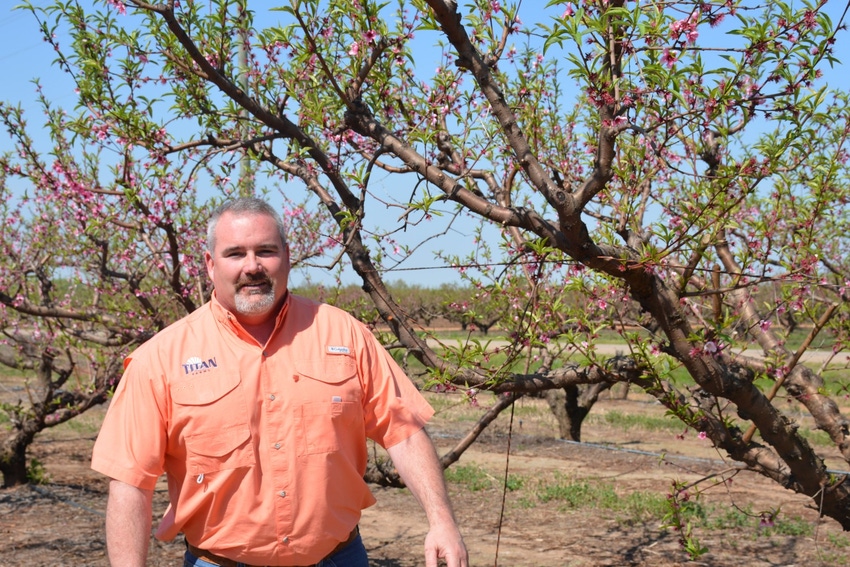
Chalmers Carr feels fortunate many of his scheduled H-2A workers are on his farm now or in route from Mexico, but at this time it is not enough workers for his entire operation this year.
Carr farms peaches, broccoli and peppers in Ridge Spring, S.C., and the Temporary Agriculture Workers Program H-2A is vital to his and other farmers' operations.
On March 18, in response to the global pandemic COVID-19, the U.S. Embassy in Mexico City and all U.S. consulates in Mexico suspended immigrant and nonimmigrant visa services until further notice. The action, and restrictions in other countries, put in question U.S. fruit and vegetable growers' access to the skilled immigrant labor it receives through the H-2A visa program.
In response, USDA and the U.S. Department of Labor worked together to find solutions. Returning H-2A workers from Mexico, Jamaica and South Africa will be processed as emergency petitions. Returning workers from Mexico who did not have a waiver of required in-person interview last year may request one now, according to information provided by the National Cotton Council.
USDA and DOL initiated a plan opening access to nearly 20,000 H-2A and H-2B certified positions that have expiring contracts in the coming weeks inside the U.S. There will be workers leaving these positions who could be available to transfer to a different employer’s labor certification under the worker programs within the U.S. already.
Domestic Lack
When he purchased his farm in 2001, Carr employed 175 H-2A workers. Last year, his number of H-2A workers peaked at 817 workers.
“The H-2A worker is very important to our farm as it is to our industry in the Southeast and peaches, as every commercial peach operator is an H-2A user. We had to go to the H-2A program because of lack of domestic to do these jobs,” Carr said.
Last year, Carr advertised for more than 1,200 jobs to harvest and pack vegetables, but only seven Americans applied. He said this illustrates the need for H-2A.
Carr currently has 390 H-2A workers working on farm with 68 in route on buses from Mexico. He said 99% of his workers are retuning workers eligible for a U.S. State Department visa waiver. If more workers aren’t allowed in, he said, it could cause major disruptions to his and other farms.
He stressed that the 390 workers currently working on his farm and the 68 workers on the way represent only half of his workforce and can only handle 55% of his needs. He said more labor is desperately needed.
Carr explained that it takes about one-third of his labor force to grow and cultivate his peach, broccoli and pepper crops with another two-thirds needed to harvest, pack and ship the crops. Carr currently has enough workers to prune his peach trees, but not enough to harvest and pack the peach crop, which he will need May through August.
“We are very concerned about that, the economic impact of that. My company has grown to about a $50 million in sales a year, so you can imagine if I did not have my workers here what impact it would have not only on us personally but on the local communities we support in South Carolina, where we are the second largest farmer in the state,” Carr said.
Carr joined American Farm Bureau President Zippy Duvall and Yuma, AZ, produce farmer John Boelts in a conference call with reporters March 20.
No Shortage
Duvall drove the point that the United States does not face a food shortage during the COVID-19 pandemic, but he did stress the federal government’s decision to halt some of the visa processing services at the U.S consulate in Mexico is bringing significant challenges to agriculture.
“We do not in America face a shortage of food. The rumor persists and it is causing unnecessary alarm. The change in the consumer’s purchasing patterns has caused empty spots on the shelves in the grocery stores and those shelves are being restocked right now,” Duvall said during the call
“The food supply chain remains strong today and farmers and ranchers are committed to maintaining it. Suppliers are diverting food heading to restaurants and foodservice providers to instead reach our grocery stores where the shelves can be restocked. We are realistic about the serious challenges before us in agriculture,” Duvall emphasized.
Duvall said the United States relies on more than a quarter million H-2Aworkers every year with 93% of that labor coming from Mexico.
“We have to fix this problem. If we don’t, we’re going to face another shock several months from now. We are engaged in ongoing dialogue with the administration, including the White House, State Department and USDA. We are really proud of our secretary. He has picked up the torch for agriculture and worked really hard to help us go down the road and try to find solutions to this. We’re going to make sure that farmers get workers that they need so the supply chain can remain open,” Duvall said.
John Boelts, who farms fresh produce in the winter months in the southwest corner of Arizona, said his farm has become increasingly dependent on the H-2A program to meet its labor needs. His farm supplies winter vegetables such as lettuce, broccoli and the cauliflower to the United States and Canada
“We’ve been increasingly dependent on the H-2A program to fill the gaps that we lack due to Congress not taking action over the last three decades to improve our labor laws and our immigration law so that agriculture would have an adequate workforce,” Boelts said.
He noted that he and other farmers in his part of Arizona use between 3,000 to 8,000 H-2A workers because the domestic population typically will not do the work of planting and harvesting vegetables.
About the Author(s)
You May Also Like






